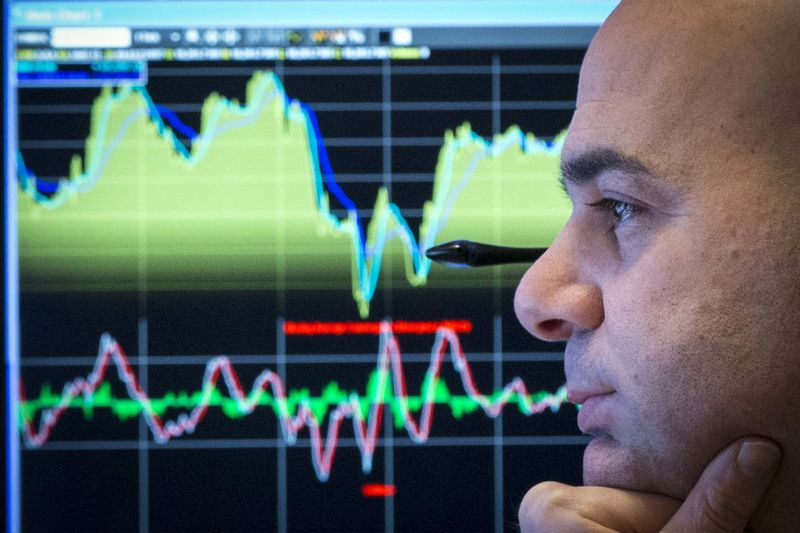* Graphic: World FX rates in 2020 http://tmsnrt.rs/2egbfVh
* Coronavirus death toll in China rises to 361
* China central bank injects $174 bln of liquidity on Monday
* Economists lower growth forecasts for Chinese economy
* European shares rise on Brexit relief
By Ritvik Carvalho
LONDON, Feb 3 (Reuters) - A gauge of global stocks was near
seven-week lows on Monday as Asian stocks plunged on their first
trading day after a long break, amid fears the coronavirus
epidemic would hit demand in China.
Despite the selling in Asia, though, markets elsewhere
showed signs of rebounding from a selloff that pushed global
stocks into negative territory for the year.
Shares opened higher in Europe on relief that the UK had
finally exited the European Union, although ongoing fears over
the virus kept buying in check. .EU
Futures for U.S. stocks were higher ESc1 , oil pared early
losses while safe havens Japanese yen JPY= and gold XAU=
stepped back from recent highs.
Aiming to head off any panic, China's government took steps
to shore up an economy hit by travel curbs and business
shut-downs. But Chinese shares were
deep in the red, with the blue-chip index .CSI300 down 7.8% to
a four-and-a-half-month low.
The benchmark Shanghai Composite index .SSEC lost $420
billion of its value and the yuan opened at its weakest level in
2020, sliding past 7 per dollar CNY= . MSCI's All Country World Index .MIWD00000PUS , which tracks
shares in 47 countries, was down 0.2% on the day, touching its
lowest since Dec. 16.
The pan-European STOXX 600 index was 0.2% higher in early
London trading. Blue-chip British stocks .FTSE added 0.4%.
While China's losses were heavy, they were mostly a product
of selling pressure that had built up over the Lunar New Year
break, not a reflection of new market fears.
"The market seems to have reacted quite reasonably," said
Pala Asset Management portfolio manager David Nietlispach.
"There is no panic and no selloff of securities that are
unrelated to the coronavirus. The government interventions have
been so heavy, though, that you will see an impact on the global
economy."
Asian markets, more broadly, continued to sell off. MSCI's
broadest index of Asia-Pacific shares outside Japan
.MIAPJ0000PUS was down for an eighth straight day, falling
0.9% at 527.39 points, its lowest since early December.
Japan's Nikkei .N225 dropped 1% to the lowest since
November and Australia's benchmark index .AXJO ended down
1.3%.
"The impact in Chinese equity markets has been in line with
what futures were suggesting, so the market has taken the slump
in its stride," said Rodrigo Catril, Sydney-based strategist at
National Australia Bank. "There was also some cushion from the
new measures."
A total of 361 people have died in China from the
coronavirus. The first death outside the mainland was reported
on Sunday in the Philippines. SLOWDOWN
In a bid to soften the blow on China's economy, the
country's central bank cut reverse repo rates by 10 basis points
and injected 1.2 trillion yuan ($173.8 billion) of liquidity
into the markets on Monday. Beijing also said it would help companies that produce vital
goods resume work as soon as possible, state broadcaster CCTV
reported. Still, a raft of global economists, including Citigroup,
Nomura and JPMorgan, downgraded their forecasts for China's
economic growth. "By extension, this will likely have an impact on global
growth, too, given China's large contribution to global growth,"
Nomura said.
That means equity markets, especially in Asia, will likely
remain under pressure as the number of infections is expected to
increase in the weeks ahead.
"Until the rate of new cases peaks, equities are in limbo –
too late to sell, too early to buy," said Sean Darby, Hong
Kong-based strategist at Jefferies.
As Chinese markets opened after the 10-day break, Shanghai
copper SCFcv1 hit its daily selling limit as did Shanghai
crude oil ISCcv1 while yields on the country's 30-year
government bonds traded in the interbank market were down 18.5
basis points. Dalian soymeal DSMcv1 plunged 4.1% while Dalian iron ore
DCIOcv1 hit limit down as steel prices fell. In currencies, the safe-haven Japanese yen JPY= fell but
remained near a three-and-a-half-week high against the dollar at
108.44. The euro EUR= was 0.25% lower at $1.1066.
The pound GBP= slipped 1.1% to $1.3058 after British Prime
Minister Boris Johnson set out tough terms for European Union
talks, rekindling fears Britain would reach the end of an
11-month transition period without agreeing a trade deal. GBP/
The dollar index, which measures the U.S. currency against a
basket of major currencies, was higher 0.25% at 97.638. .DXY
Gold XAU= , which posted its best month in five in January,
slipped as much as 1% to $1,574.5 an ounce. Yields on U.S. debt
came off lows. US2YT=RR
Oil prices recovered some losses after Reuters reported that
OPEC and its allies are considering a further cut to oil output.
Brent crude LCOc1 was last down 0.3% at $56.44 a barrel
after falling more than $1 at one stage. U.S. crude CLc1
gained 0.4% to $51.78.
